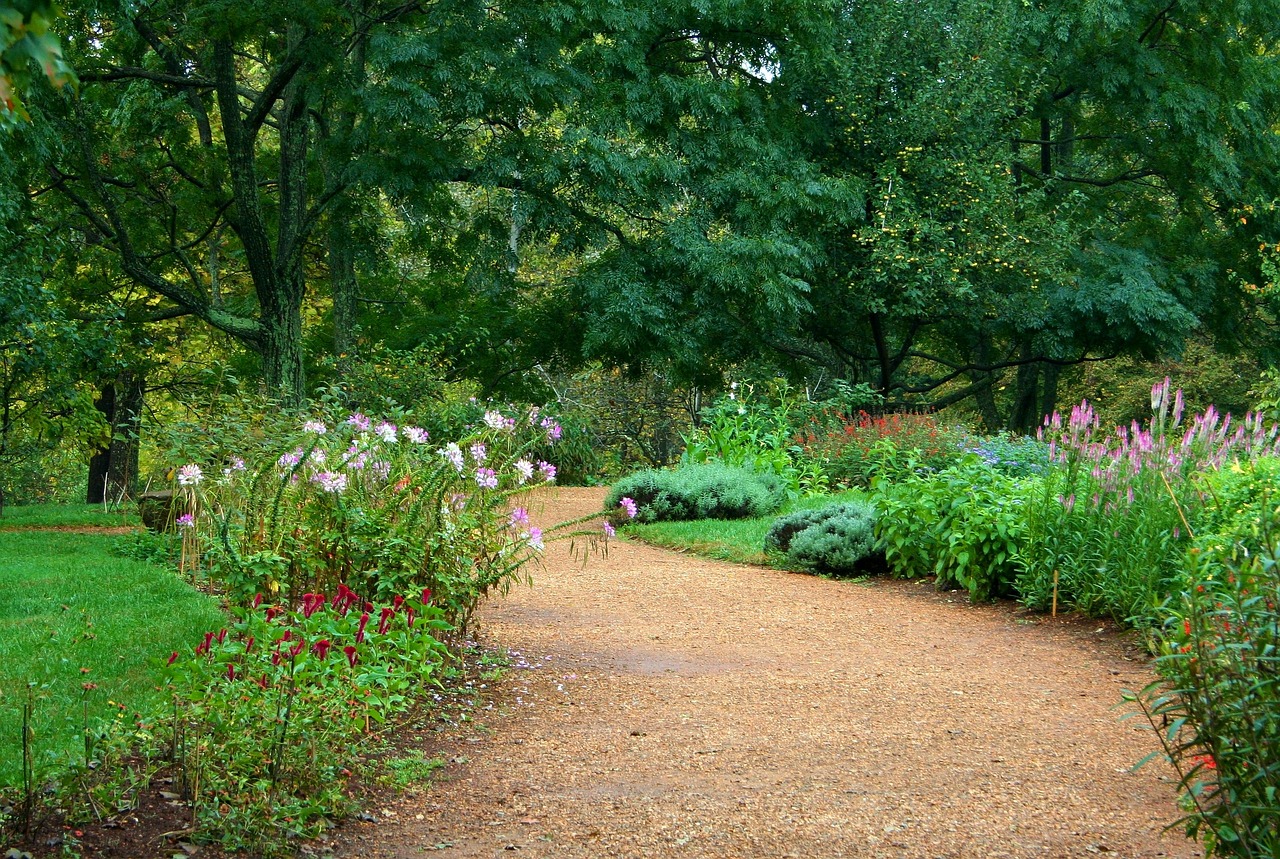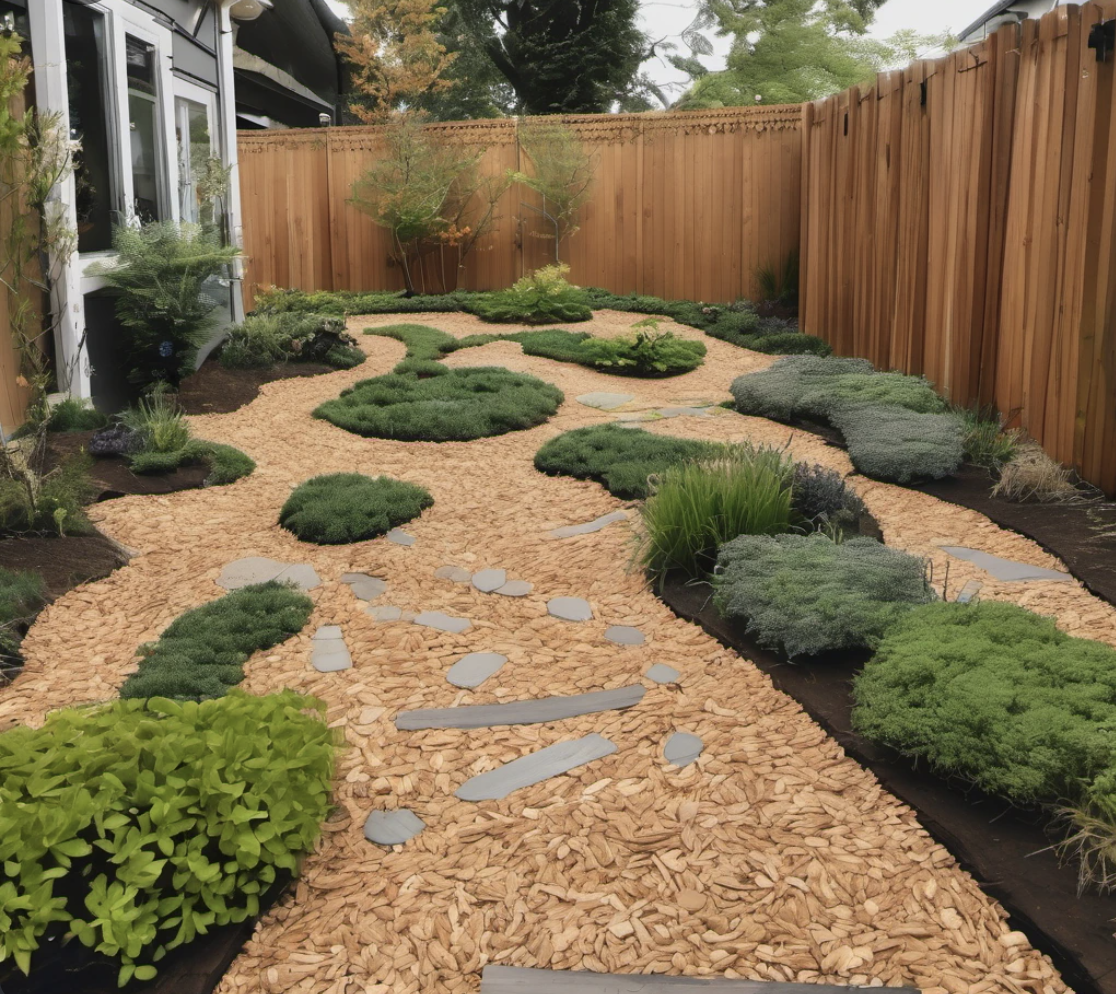At Genesis Gardens, we believe in creating beautiful gardens that are low-maintenance and kind to the environment. While concrete offers a seemingly straightforward solution for patios and pathways, it can disrupt natural drainage, contribute to urban heat island effects and limit valuable planting space. Thankfully, several attractive and sustainable alternatives can create a charming and low-maintenance haven in your outdoor space.
1. Embrace the Natural Look with Gravel Pathways
 Gravel paths offer a classic and low-maintenance solution for navigating your garden. Choose a well-draining sub-base, such as compacted hardcore, before laying a weed membrane and topping it with a layer of gravel. Opt for pea gravel for a smooth, contemporary look, or larger stones for a more rustic feel.
Gravel paths offer a classic and low-maintenance solution for navigating your garden. Choose a well-draining sub-base, such as compacted hardcore, before laying a weed membrane and topping it with a layer of gravel. Opt for pea gravel for a smooth, contemporary look, or larger stones for a more rustic feel.
Top Tip: Define the edges of your gravel path using edging materials like timber, recycled plastic, or even a row of low-growing plants. This will prevent the gravel from spreading and add a touch of definition.
Benefits for Wildlife: Gravel paths allow water to percolate through, preventing puddles and supporting natural drainage. This benefits wildlife, particularly hedgehogs and invertebrates that thrive in well-drained environments.
2. Let Nature Lead the Way with Stepping Stones
 Stepping stones create a whimsical and natural feel while guiding visitors through your garden. Choose stones of varying sizes and textures for a more organic appearance. Place them strategically, allowing enough space for comfortable stepping. Consider using recycled paving slabs or reclaimed flagstones for a sustainable touch.
Stepping stones create a whimsical and natural feel while guiding visitors through your garden. Choose stones of varying sizes and textures for a more organic appearance. Place them strategically, allowing enough space for comfortable stepping. Consider using recycled paving slabs or reclaimed flagstones for a sustainable touch.
Top Tip: For a more stable path, consider creating a shallow trench, filling it with compacted sub-base material, and laying the stepping stones on top. This will prevent them from shifting over time.
Benefits for Wildlife: Stepping stones leave plenty of space for plants to grow between them, creating mini-habitats for insects and pollinators. Moss can naturally grow on the stones over time, adding to the natural aesthetic and providing a haven for small invertebrates.
3. Explore the Beauty of Woodchip Paths
 Woodchip paths are a budget-friendly and environmentally-friendly option. Use a weed membrane underneath to prevent unwanted growth and top it up with a layer of woodchips. Choose long-lasting hardwood chips like oak or beech for optimal durability.
Woodchip paths are a budget-friendly and environmentally-friendly option. Use a weed membrane underneath to prevent unwanted growth and top it up with a layer of woodchips. Choose long-lasting hardwood chips like oak or beech for optimal durability.
Top Tip: Regularly top up your woodchip path as the chips decompose naturally. This will maintain its aesthetic appeal and prevent weeds from taking hold.
Benefits for Wildlife: Woodchip paths provide a safe haven for a variety of creatures, including insects, worms, and small mammals. The decomposing woodchips also add nutrients back into the soil, promoting healthy plant growth in surrounding areas.
4. Embrace the Lushness of Living Mulch
Living mulch offers a unique and low-maintenance solution for pathways. Plant low-growing, creeping plants like thyme, chamomile or Corsican mint between stepping stones or along a defined path. These plants will create a dense carpet, suppressing weeds and adding a touch of fragrance to your garden.
Top Tip: Choose a variety of plants with different colours and textures for a visually interesting living mulch path. Regularly trim the edges to maintain the desired shape and prevent the plants from encroaching on surrounding areas.
Benefits for Wildlife: Living mulch paths provide a haven for pollinators like bees and butterflies, attracting them to the fragrant flowers and providing a vital source of nectar. Additionally, the dense foliage offers shelter for beneficial insects and small creatures.
5. Define Your Space with Permeable Paving
Permeable paving offers a stylish and sustainable alternative to traditional concrete patios. These slabs or stones allow rainwater to drain through, reducing surface runoff and supporting healthy soil drainage. Choose from a variety of materials like gravel grids, recycled plastic pavers, or even grass pavers that incorporate small sections of lawn.
Top Tip: Ensure proper installation of permeable paving with a suitable sub-base material to allow for effective drainage. This will prevent waterlogging and ensure the longevity of your patio.
Benefits for Wildlife: Permeable paving allows rainwater to reach the soil below, replenishing groundwater reserves and creating a healthy environment for plants and wildlife.
Creating a Sustainable Oasis
By opting for these low-maintenance alternatives to concrete, you can create a beautiful and functional garden that is kind to the environment. These options not only reduce your carbon footprint but also promote healthy drainage patterns, create mini-habitats for wildlife, and offer a variety of textures and colours to enhance your outdoor space.
Remember, the team at Genesis Gardens is here to help you create a low-maintenance and wildlife-friendly garden you can enjoy for years to come. Contact us today for a consultation and let’s explore the possibilities together!
